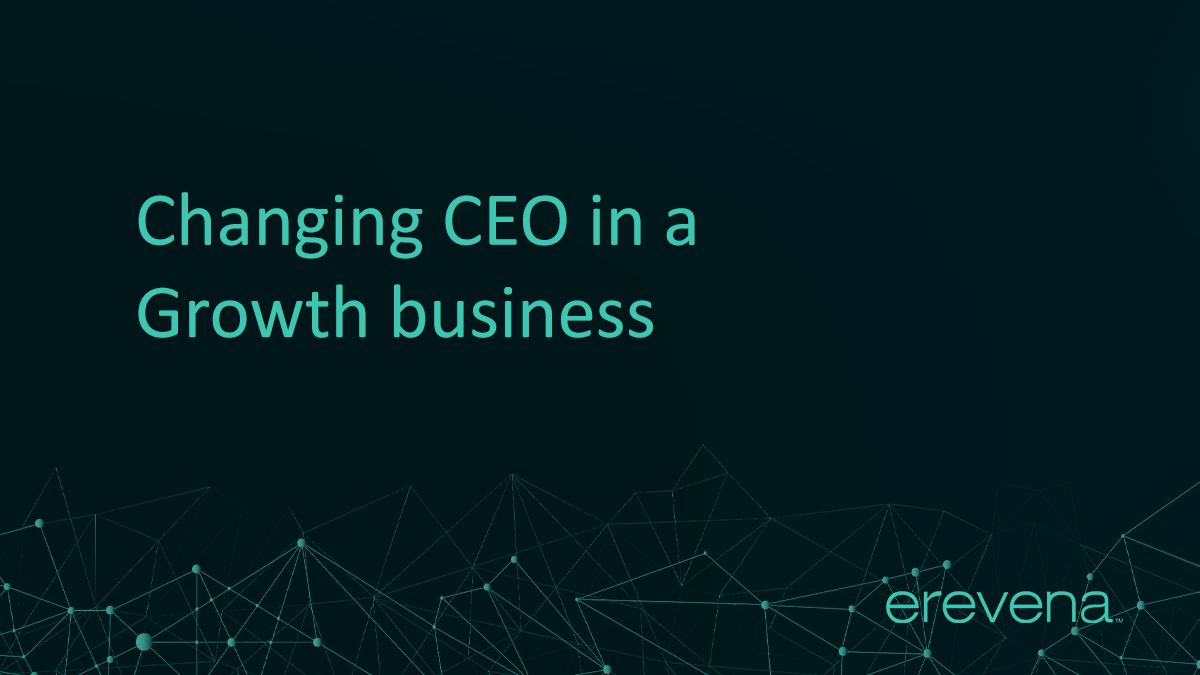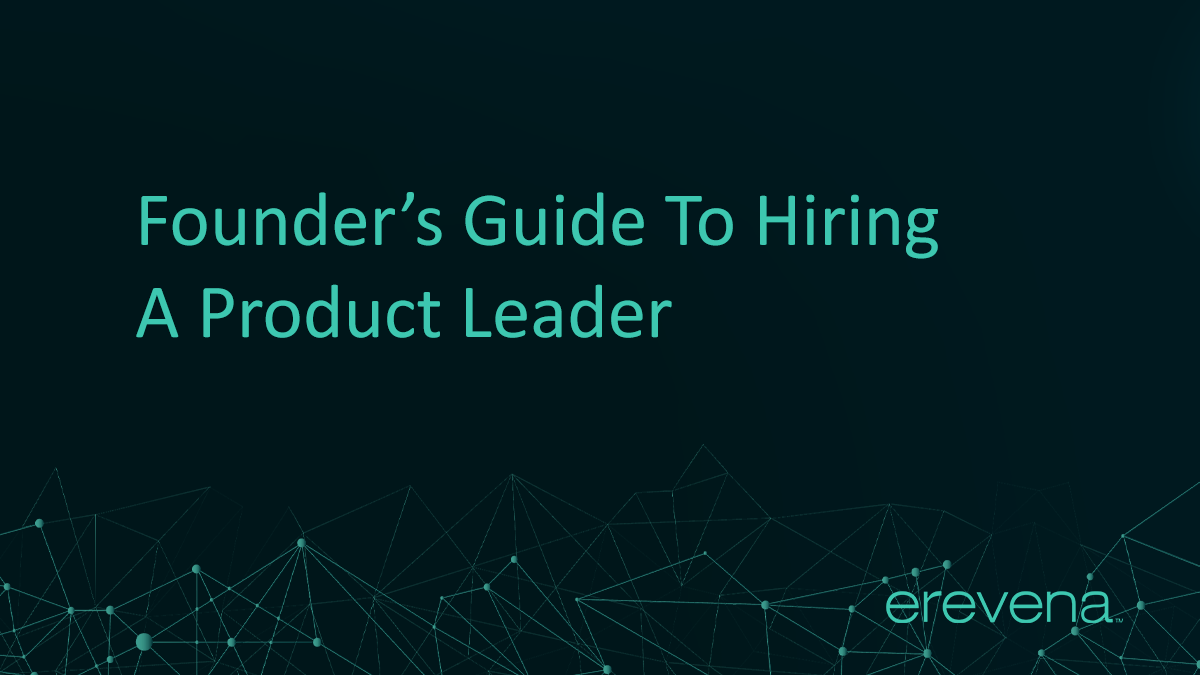Hazel Mulhare, Partner at Erevena focuses on recruiting for early-stage technology businesses, with a particular interest in Health and Deep tech. She works closely with founders to make key C-level, VP and Board level hires at Seed, Series A and Series B stages, and draws on her experience to offers words of advice to start-up founders and business leaders.
Statistically, the highest correlation to success in a hire is to base the decision on previous experience, but even then, that gives you only a 50% success rate. In a high-growth start-up, every senior hire is critical. There are a few important things to consider that help to mitigate some of the inherent risks.
Start with your business goals
For a start-up, senior appointments should be made to address medium-term business goals. There is a specificity to what is in scope for a particular role, especially as the role of what the founders and the CEO do is variable, and pulling a job spec from Google or asking someone for a ‘template’ is not the most useful place to start. As simplistic as it sounds, it is helpful to start with ‘where do we want to get to?’ as you synthesise what you think the major deliverables of the role should be. Imagine a year into this person’s tenure you are reflecting with them on an excellent job done – in this ideal world what is it that they have delivered?
Define your deliverables
Be as specific as possible about what the outcomes of this role are going to be but be aware that a search firm and/or the candidates may tell you that it may not be achievable for one person. Do you feel comfortable with them building a team to accomplish some of these deliverables and can you rank the major deliverables vs. the minors? Be aware that, although in early-stage companies it is necessary for someone to do everything from pitch to investors to taking out the bins, some of the candidates may have had teams, and even managers of teams under them for many years. Although not necessarily mutually exclusive, if you are in the early phase of growth how do you think about the potential trade-offs between someone having joined an early-stage start-up, but who throughout that company’s growth have achieved a relatively senior position in a later stage business with a large team, with wanting someone who is not only keen to be hands-on but has recent memory of ‘doing the job’ in their function.
Characteristics, traits and skills
As you define the deliverables needed, some of the skills necessary for this person to complete will become evident and should be recorded, ideally in a scorecard. For example, in a business development role, the characteristics and traits are also often things linked to the role but should also reflect something of the culture of the firm. These are the questions you ask yourself before and after the conversation with the candidate ‘I want to understand if they exhibit tenacity / did they show me examples of tenacity?’ They are also key things you will reference against.
Developing your scorecard
Developing a ‘scorecard’ – i.e. your one-pager which captures the key deliverables and the agreed ‘skills, characteristics and traits’, may involve multiple stakeholders internally (board and management team), and although it’s not always possible to have everyone agree on some of the minutia. The ‘weighting’ of which of the deliverables are ‘must haves’ vs ‘nice to haves’ or what I call the ‘majors’ and ‘minors’ of the role, should be directly reflective of a management team (and board’s) agreement on what are the most important strategic objectives of the business. If the conversation becomes unwieldy with too many stakeholders, revisit and clarify the medium-term business goals.
Scoring
Personally, I like using 0,1,2 only as scores to give a more consistent view. 0 is ‘does not demonstrate’, 1 is ‘demonstrates somewhat’ and 2 is ‘demonstrates greatly’. A 0 on a deliverable or a characteristic might not necessarily rule a candidate out. Is this something that just wasn’t probed in the interviews (more on that later) or something that can be referenced? However, ideally the successful candidate should be ‘demonstrating greatly’ against the most important deliverables (and corresponding skills, characteristics and traits) throughout the interviews and references.
Interviewing against a scorecard
Given that the same role in a different firm can look different, depending on the culture, management and individual, scorecards are a great way to challenge assumptions and help add structure and prompts for interviews. The first of which should always give the hiring manager (whoever will manage the candidate) a sense on the key deliverables. In later rounds, interviewers can be given directives based on specific deliverables (i.e. a whole interview to double down on one of these). You may also want one of these interviewers to do a ‘values based’ assessment where they spend a significant part of the interview talking about something that has ‘gone wrong’ in the candidate’s career history and how they dealt with it.
It’s also useful to observe whether the skills and characteristics/traits align. Have they been leaning into skills that they have, but don’t enjoy exhibiting? Have they been nailing their current (and similar) deliverables, but have ambitions to shift the focus of their time in the near term?
A scorecard isn’t something to have in front of you in an interview (although Zoom interviews do make it easier to have notes), it’s something you check before and after the conversation. The best way to start an interview is always to ask the candidate to tell their story chronologically and as GH Smart, author of hiring bible ‘Who’, calls it ‘stop at the stop signs’ – ask questions organically about how they’ve exhibited certain key things in their roles as they tell the story of their time in different companies. For example, ‘when you joined X firm, what was your mandate and what were the key things the CEO wanted you to achieve?’ (rather than just what they did achieve).
Insofar as it’s possible, the early rounds of interviews should centre around what they have done/achieved, and not (as the common mistake goes) what they would do in this role. This is why the scoring is important – have they really demonstrated this (vs. do I hypothetically think they could). Once three or four members of the team have met the candidate you should move to a case study/business plan stage. For any senior appointment, you want to see some colour on how the candidate has understood your business, and how they would approach the role. If this is a commercial role, you may want this to be an explicit business plan, for a technical role it may be that you want to ask them to write a 100-day plan.
There will always be risks in making a hire, but this approach allows you to have honest conversations with finalist candidates and the rest of the management team about where someone’s focus should be, where their weaknesses need support and where their strengths should be encouraged. It helps them to make their own hiring plan to mitigate against the things they like less or are not as good at.
Taking up references
It’s important to take up ‘cold’ references (i.e. not those provided by the candidate) by having confidential conversations with mutual acquaintances, this will be done by a trusted search partner, or maybe one of your investors. It requires sensitivity and will damage the reputation of the company if the candidate’s confidentiality is not protected.
For referencing with ‘warm’ referees (i.e. those the candidate has provided), these should be taken by whomever is line-managing the candidate (always the CEO for a C-level hire). It is best to keep it conversational and simple. Start by explaining a little about the company for context and briefly outline the key deliverables for this role. Clarify the nature of their relationship with the candidate. You likely want to say ‘we are excited to be having these discussions with X and he/she has really impressed us so far’ so that it’s a more relaxed conversation (where they are more likely to tell the truth).
It’s useful to then allow them to give you their high-level thoughts in a less structured manner, as they’ll tend to hit on what they think were the most important pieces of what they did. Pick out a few of the things they’ve said that feel most relevant and ask for anecdotes.
Obviously, if they don’t mention something which is a key deliverable/characteristic then you’ll need to ask directly. For example, ‘One thing that’s important to us is tenacity, do you think X is a tenacious person and do you have any examples’…. The important thing at this point is to ‘level’ with the referee by saying e.g. ‘this is a high growth environment and he’s going to need to develop a market almost single-handedly, do you have an impression of how he’d deal with that?’ – some people hate those questions, but it leads to the punchline(s) which should be something like e.g. ‘how do you think I / the Board could best support X in the role / making this transition’ (this is weirdly the question that will most often lead to them telling you the candidates weaknesses, without ever having to say ‘weakness’ (which usually scares people). You may also want to say (conspiratorially, once you’ve had a good informal chat) ‘Thank you so much for taking the time. I suppose lastly, this is a small team and we are going to all get really close, is there anything else you think I should know?’. Off the heels of the ‘support’ question, they usually elucidate a ‘weakness’ without having to call it as such.
Compensation
Whilst you will need to have a budget for a hire going into a search process, finding the right number for a candidate is not formulaic and benchmarking will only get you so far. You will want to take into account a specific candidate’s current compensation (which you can ask the search firm to highlight as they shortlist candidates) and you will want to have a strong understanding of what is important to them / how highly they value long-term equity upside. In ‘Who’ GH Smart talks about identifying which of the five F’s really matter to the candidate: fit, family, freedom, fortune or fun. What are the key factors to this person’s decisions thus far and what have they communicated as ‘push’ and ‘pull’ factors (why move and why move to your company).
This does not mean you should pay whatever somebody demands, but it does mean that you should take a sensible approach to this topic if you feel that you have found the perfect match. It’s not worth losing the ideal candidate over quibbling about compensation package, the right candidate will deliver far more value to your business than you will lose on compensation negotiations. If you’re not convinced of this, then they’re not the right candidate. If you are a founder of an early-stage company be aware that you may have to pay your new hire more than you are taking out of the business yourself, again it is worth this investment to secure the right person for your future growth.
Offer
Whilst this is likely a big decision for you, it’s an even bigger leap for the candidate and shouldn’t feel like a shot-gun marriage. An offer should be made over the phone or in-person and should begin with why you believe they are the best candidate for the role. Be as specific as possible and have an offer letter waiting to go over email which echoes all the key points. Through the process, you will have got to know what they enjoy and what they don’t, their strengths and weaknesses and they too should know about why this is an incredibly exciting opportunity, but also the challenges ahead and why they are the right person to join you in tackling these.
Hopefully, you now have a clear view on how to have a more structured, thoughtful and in-depth interview process. This is meant to be something you can revisit, like the scorecard, through a process.
If you are a start-up founder or business leader, you live in a high-risk world, but no matter the stage of a business the most successful hire will always be the one with a clear mandate and an empowered position to execute on it.
Further reading:
GH Smart ‘Who’
Lazlo Bock ‘Work Rules’
Lou Adler ‘Hire with your head’
George Anders ‘A Rare Find’
Share this article:













